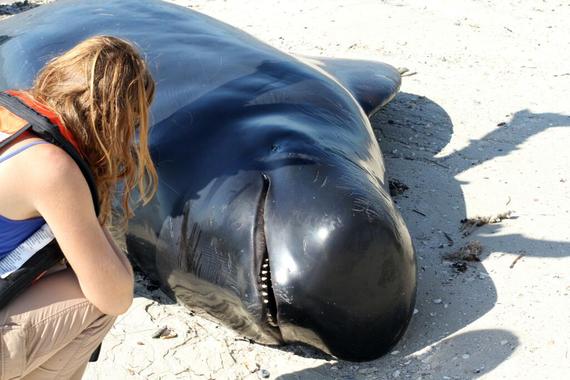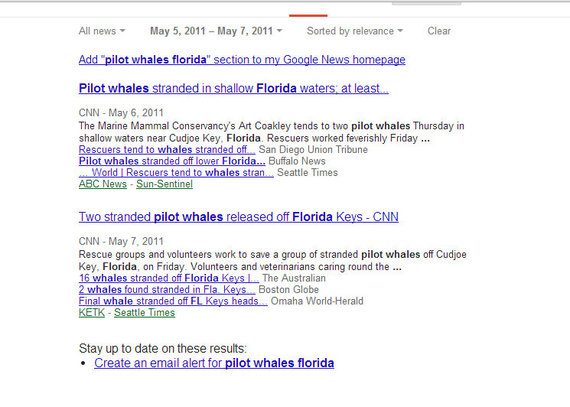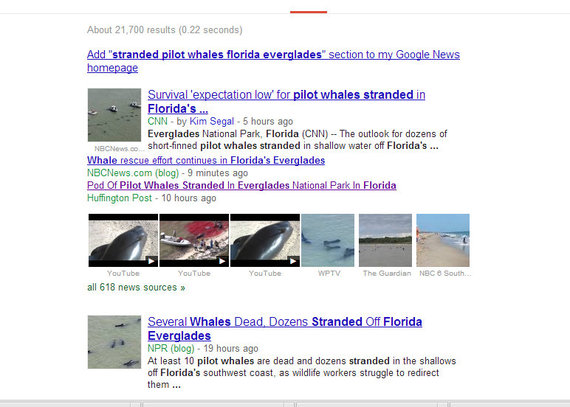While the recent pilot whale stranding in the Florida Everglades is an example of events that seems to occur all too often and usually results in the death of entire pods, in this case most of the whales have survived the initial stranding.
This is definitely a good news/bad news story, another example of what happens when people and cetaceans (whales and dolphins) encounter one another. The fact is, it nearly always works out in the humans' favor while the result for the animals is not always positive and runs the gamut from gruesome death to the pure joy of riding the bow wakes created by our boats.
NOAA appears to have done a fantastic job in responding to the stranded whales, quickly assessing which ones needed to be euthanized and monitoring the rest, then easing up and allowing the animals a chance to make it out to deeper water on their own, which most did. There is a danger that the whales may re-strand, so NOAA will continue to monitor them until they are in much deeper water.
The cause of the stranding is not confirmed, but it is reminiscent of the recently published report in which the stranding of a pod of melon-headed whales was proven to be caused by sonar:
An independent scientific review panel has concluded that the mass stranding of approximately 100 melon-headed whales in the Loza Lagoon system in northwest Madagascar in 2008 was primarily triggered by acoustic stimuli, more specifically, a multi-beam echosounder system operated by a survey vessel contracted by ExxonMobil Exploration and Production (Northern Madagascar) Limited.
WCS and IFAW support these conclusions that add to a mounting body of evidence of the potential impacts of anthropogenic noise on marine mammals," said Dr. Howard Rosenbaum, Director of the Ocean Giants Program for WCS. "Implications go well beyond the hydrocarbon industry, as these sonar systems are widely used aboard military and research vessels for generating more precise bathymetry (underwater mapping). We now hope that these results will be used by industry, regulatory authorities, and others to minimize risks and to better protect marine life, especially marine mammal species that are particularly sensitive to increasing ocean noise from human activities.
NOAA can be trusted to sort out the cause, whether or not it will be easy for the public to know the results. Unfortunately, both the military and the oil industry are allowed a certain number of "takes," scaled by how great the damage and the status of the animals, which includes everything from displacing them to deaths of the non-endangered ones.
Okay, enough of the bad news, now for the really good news. Notice the two screenshots below -- the first shows the news coverage of a similar stranding just a bit more than a year and a half ago. The second shows the coverage of this event, and that has gone up since I took it yesterday morning.
Only 11 news reports over a two-day period, with a very broad keyword search, May 2011.
Compare that to this week: 618 news reports from all over the globe, even with a more specific keyword search, December 2013.
People care, and are paying attention to whale and dolphin issues in unprecedented numbers. Sure, this recent group wisely chose a place with mystery and panache to seek refuge -- "lost in the Everglades" has a much more intriguing ring than "stranded on Cudjoe Key" -- but even that accounts for little. If anything, the Blackfish effect can be credited. Blackfish is a film with Oscar buzz that opened our eyes to why whales don't belong in tanks, and at the same time it ignited our curiosity about them.
Whales and dolphins are intelligent beings with ancient cultures; we are fascinated by what we learn and are mesmerized when they grace us with their gentle presence.
The web lets us know what is going on in real time (NOAA kept us updated with Twitter), and each time we help the distressed cetaceans we learn a bit more. For more information on an ongoing effort to understand whale stranding, please check out the International Whale and Dolphin Stranding Network website or Facebook page.
NOAA's full report can be found here.



